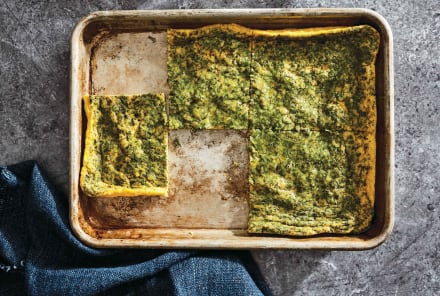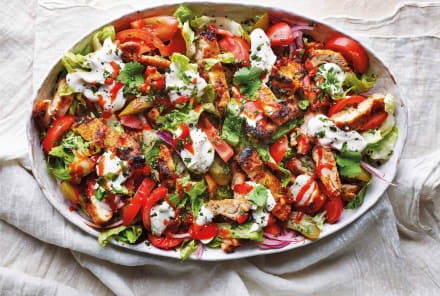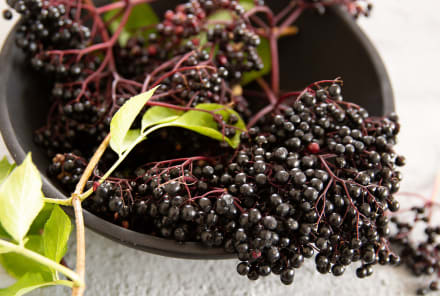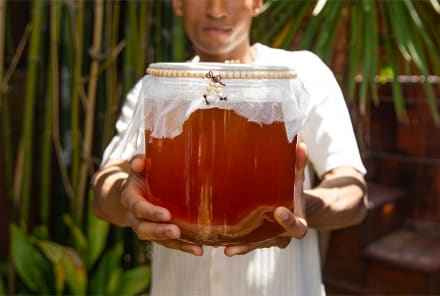Advertisement
A Stomach-Soothing Lentil Soup This MD Relied On Through Chemo

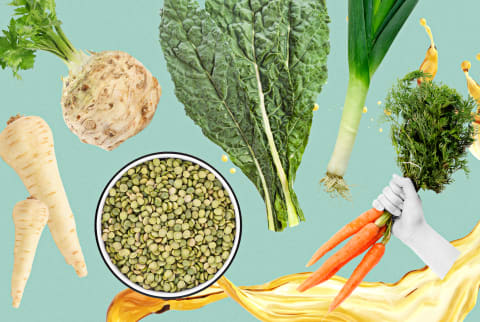
When I was diagnosed with breast cancer, it was one of the first times I realized, despite being a doctor, I had no control over the outcome of my own disease. But getting back in touch with what I was cooking, eating, and drinking was one way that I learned to cope—emotionally and physically—with treatment.
Throughout my radiation, surgery, and chemotherapy, I began making nutrient-dense meals that not only made me feel healthy but also tasted good. One go-to lunch during that journey was dal: a lentil soup with spinach.
Dal is one of my favorite comfort foods, but even if you didn't grow up eating it, I'm sure you'll find it filling and soothing. The turmeric is an added bonus. Asafetida powder is used in Indian cooking as a digestive, helping to lower the effects of gas and bloating from foods like beans and lentils. While it has a pungent aroma, it is very flavorful once added to a dish. Overall, the soup is comforting and flavorful and became a staple during my treatment.
Lentil Soup With Spinach (Dal) Recipe
Prep time: 30 minutes (plus overnight soaking)
Cooking time: 20 minutes
Servings: 8
Ingredients
- 2 cups yellow split pea lentils
- 2 tablespoons ghee
- 1 teaspoon black mustard seeds (optional)
- 1 teaspoon cumin seeds
- 2 cloves garlic, peeled and sliced in half lengthwise
- 1 dried whole red chili (optional)
- 1 medium onion, finely chopped
- 1 medium tomato, finely chopped
- 1 teaspoon ground turmeric
- ¼ teaspoon black pepper
- 2 cups spinach leaves
- 2 cups water
- 1 tablespoon kosher salt
- ½ lemon
- 1 teaspoon asafetida powder (optional)
- Chopped fresh cilantro for garnish
Method
- Rinse and soak the lentils in a covered glass bowl in the fridge overnight. Make sure the water covers the lentils by about a half-inch.
- Rinse out the lentils the next day, transfer to a large saucepan, and add 4 cups water.
- Boil the lentils for about 30 minutes, until soft. The texture should be smooth, like a paste. Alternatively, you can cook the lentils in a pressure cooker—follow the directions supplied by your pressure cooker manufacturer.
- Heat the oil in a medium stainless-steel pot over medium heat. Add the black mustard seeds, if using, and cook until they pop. Add the cumin seeds, garlic, dried red chili, if using, and chopped onion. Cook for 3 to 5 minutes or until the onion is translucent.
- Add the tomato, turmeric, and black pepper, and stir to combine. Add the spinach and allow to wilt for just 1 minute.
- Add the lentils, lower the heat, and allow to cook for about 20 minutes. Add the water, as the mixture will be thick, and you want to prevent the lentils from sticking.
- Season with the salt, a squeeze of fresh lemon, and the asafetida powder.
- Serve hot, garnished with chopped cilantro.

Dr. Uma Naidoo is a Harvard-trained nutritional psychiatrist, nutritional biologist, professional chef, and author of the upcoming title, Calm Your Mind With Food, which is now available for preorder, as well as the international bestseller, This Is Your Brain on Food (An Indispensible Guide to the Surprising Foods that Fight Depression, Anxiety, PTSD, OCD, ADHD, and More).
She is currently the Founder and Director of Nutritional and Lifestyle Psychiatry at Massachusetts General Hospital (MGH), the first US clinic of its kind where she consults on nutritional interventions for the psychiatrically and medically ill. Naidoo is also a culinary instructor at The Cambridge School of Culinary Arts. She writes for Harvard Health and Psychology Today. She just completed her most recent project which is a unique video cooking series for the MGH Academy that teaches nutritional psychiatry using culinary techniques in the kitchen.
More from the author:
Functional Nutrition Training
Check out Functional Nutrition Coaching
A cutting-edge nutrition deep dive taught by 20+ top health & wellness experts
Learn moreMore from the author:
Functional Nutrition Training
Check out Functional Nutrition Coaching
A cutting-edge nutrition deep dive taught by 20+ top health & wellness experts
Learn more
Dr. Uma Naidoo is a Harvard-trained nutritional psychiatrist, nutritional biologist, professional chef, and author of the upcoming title, Calm Your Mind With Food, which is now available for preorder, as well as the international bestseller, This Is Your Brain on Food (An Indispensible Guide to the Surprising Foods that Fight Depression, Anxiety, PTSD, OCD, ADHD, and More).
She is currently the Founder and Director of Nutritional and Lifestyle Psychiatry at Massachusetts General Hospital (MGH), the first US clinic of its kind where she consults on nutritional interventions for the psychiatrically and medically ill. Naidoo is also a culinary instructor at The Cambridge School of Culinary Arts. She writes for Harvard Health and Psychology Today. She just completed her most recent project which is a unique video cooking series for the MGH Academy that teaches nutritional psychiatry using culinary techniques in the kitchen.
Watch Next
Enjoy some of our favorite clips from classes
Enjoy some of our favorite clips from classes
What Is Meditation?
Mindfulness/Spirituality | Light Watkins
Box Breathing
Mindfulness/Spirituality | Gwen Dittmar
What Breathwork Can Address
Mindfulness/Spirituality | Gwen Dittmar
The 8 Limbs of Yoga - What is Asana?
Yoga | Caley Alyssa
Two Standing Postures to Open Up Tight Hips
Yoga | Caley Alyssa
How Plants Can Optimize Athletic Performance
Nutrition | Rich Roll
What to Eat Before a Workout
Nutrition | Rich Roll
How Ayurveda Helps Us Navigate Modern Life
Nutrition | Sahara Rose
Messages About Love & Relationships
Love & Relationships | Esther Perel
Love Languages
Love & Relationships | Esther Perel
What Is Meditation?
Box Breathing
What Breathwork Can Address
The 8 Limbs of Yoga - What is Asana?
Two Standing Postures to Open Up Tight Hips
How Plants Can Optimize Athletic Performance
What to Eat Before a Workout
How Ayurveda Helps Us Navigate Modern Life
Messages About Love & Relationships
Love Languages
Advertisement

How To Use Food To Recover From Autoimmunity: An MD's Top 4 Tips
Sara Szal Gottfried, M.D.
